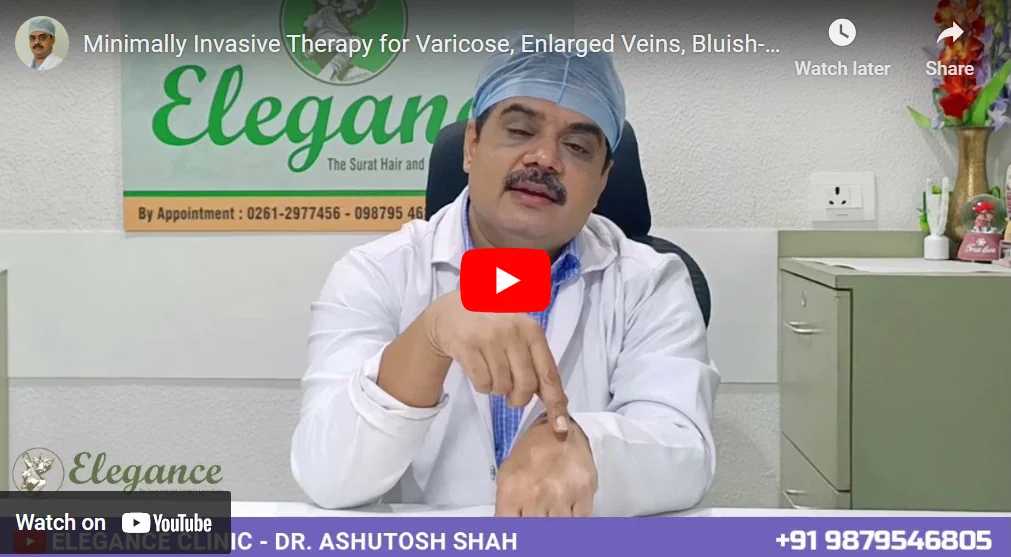Minimally invasive therapy for varicose veins is a treatment option that uses small incisions or needles to treat varicose veins, which are enlarged, twisted, and often painful veins that can occur in the legs. These treatments are an alternative to traditional surgical procedures and aim to minimize pain, scarring, and recovery time for patients.
Some examples of minimally invasive therapies for varicose veins include:
- Endovenous laser therapy (EVLT): This procedure uses a laser to deliver high-energy light to the vein, causing it to collapse and eventually be reabsorbed by the body.
- Radiofrequency ablation (RFA): This procedure uses radiofrequency energy to heat the walls of the vein, causing it to collapse and eventually be reabsorbed by the body.
- Sclerotherapy: This procedure uses a solution to collapse the vein, which is then reabsorbed by the body.
- Microphlebectomy: This procedure removes varicose veins through small puncture sites.
All these procedures are typically performed on an outpatient basis and take around 30 minutes to an hour to complete. Local anesthesia is typically used to numb the area, and patients may experience mild discomfort during the procedure. After the procedure, patients are typically able to return home on the same day.
It’s important to note that minimally invasive therapies for varicose veins are relatively new procedures, and long-term outcomes are not yet known. The procedure may have potential risks such as bleeding, infection, and allergic reactions. It is important to consult with a qualified healthcare professional to determine the best treatment option for your individual needs and goals. Follow-up care is typically required to monitor the success of the treatment and to address any potential complications.
If you have any questions regarding our services, please contact us or call at +91 9879546805.
Hear from our patients
EXCELLENTTrustindex verifies that the original source of the review is Google. Had a vericose vein surgery for both legs.such a supportive doctors and team.Special Thanks to Dr.Aashutosh shah,sunnybhai and all the staff members for wondrful service.Trustindex verifies that the original source of the review is Google. Thank you sir your treatment is very goodTrustindex verifies that the original source of the review is Google. Very happy.. Very good service.. Very good staff..Trustindex verifies that the original source of the review is Google. Amazing staff, totaly supportive. Dr ashutosh sir & his Team totaly take care of the patients & does the procedure properly
Frequently Asked Questions
Having doubts and questions? These are few questions our customers normally ask us!
What is the purpose of hymenoplasty surgery?
Hymenoplasty is performed to reconstruct the hymen, which may be desired for cultural, religious, or personal reasons.
Can the hymen grow again?
The hymen does not regrow naturally; however, hymenoplasty surgically restores its presence.
Why is my hymen not opening?
Variations in hymen elasticity and opening are normal. If there are concerns, it’s best to consult a gynecologist.
Can a girl bleed after hymenoplasty?
Some bleeding is possible after hymenoplasty, similar to what might occur with the initial breaking of the hymen.
Can hymen bleed 2 times?
The hymen can only bleed once naturally. Post-hymenoplasty, it may bleed again upon rupture.
Does hymenoplasty restore virginity?
Hymenoplasty reconstructs the hymen physically but does not ‘restore’ virginity in a biological sense.
How many times can hymen bleed?
The hymen typically bleeds once upon tearing. After hymenoplasty, it may bleed again if ruptured.
Can a non-virgin bleed again?
Post-hymenoplasty, a woman may experience bleeding upon the hymen’s rupture, similar to the first time.
Is it necessary to bleed on the first night?
Bleeding is not a universal indicator of virginity or sexual experience. It varies among individuals.
How can a husband know that his wife is not a virgin?
Virginity cannot be determined physically. It’s a personal aspect that relies on trust and communication.
How long does hymen take to heal?
The healing time for hymenoplasty is typically around 6-8 weeks, but it can vary.
Do boys bleed on the first night?
Boys do not experience bleeding related to virginity.
Did your wife bleed on the first night?
This is a personal and private matter, and bleeding is not a definitive indicator of virginity.
Can you bleed if your partner is too big?
Bleeding can occur due to various reasons, including the size of the partner, but it’s not a certainty.
Contact Us
Ready to discuss Minimally Invasive Therapy for Varicose? Fill out our contact form for a confidential consultation.








